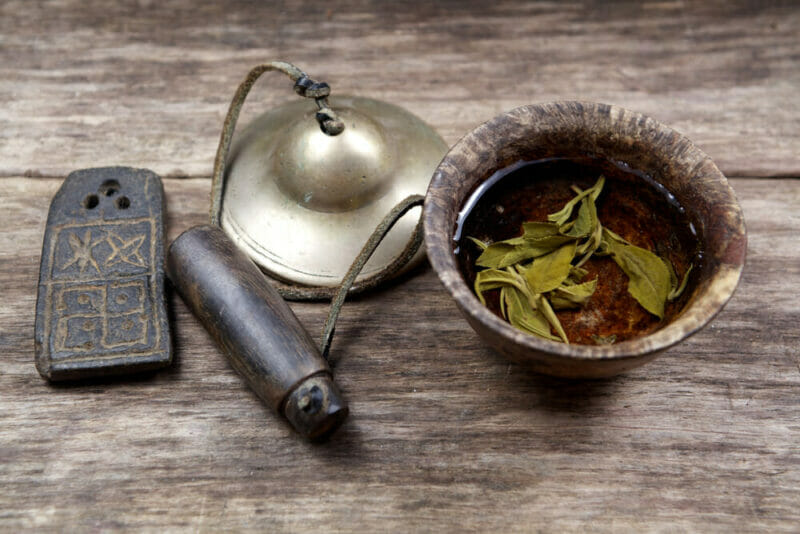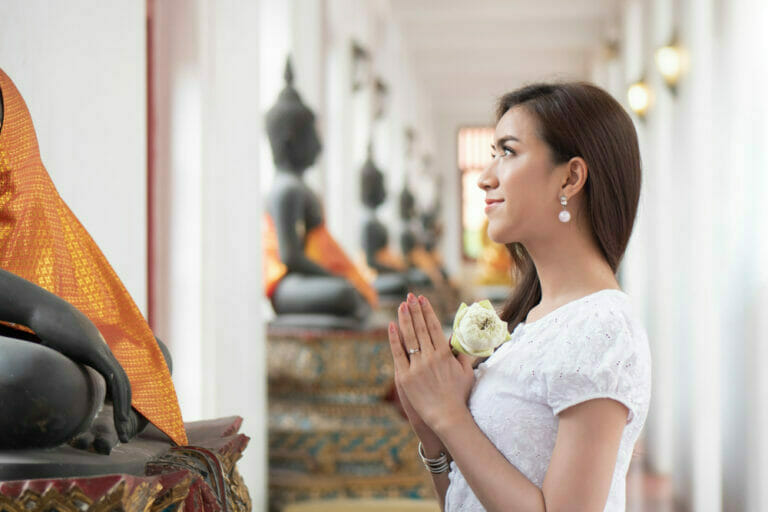From Leaf to Spirit: The Role of Tea in Buddhist Practice
Tea, a widely consumed beverage for centuries, has a history dating back 5000 years in China.
This post examines various types of tea accessible to Buddhists, their advantages, and guidelines for consumption. Additionally, it delves into customs linked to Buddhist tea drinking.
The practice of offering guests some form of refreshment when they visit (such as tea, fruits etc.) is deeply rooted in Buddhist culture and behavior, and continues to be practiced throughout Asia today.
In Buddhism, the Buddha encouraged his followers to abstain from drinking alcohol and drugs. This does not mean, however, that one should never drink anything; it is important to consume things in moderation.
There are, therefore, some monks who drink tea for its calming properties, while others may not drink any tea.
What Types of Tea Are Consumed by Buddhist Monks?
In addition to traditional teas of a particular country, tea from other places is also popular with Buddhist monks. Green tea and oolong tea are two of the most popular types of tea for Buddhist monks.
Green tea has a lot of antioxidants which means it can help with things like inflammation and cancer prevention.
Oolong Tea is made from the leaves of Camellia Sinensis plant which produces caffeine; however the amount is less than coffee so it’s easier to digest for those who are sensitive to caffeine as well as being great for weight loss.
Here are some Olong teas you can find on Amazon:
Interestingly enough, green tea consumption has been shown to contribute to longevity – not only by providing anti-oxidants but also by increasing sensitivity to insulin or lower blood pressure, among other things.
Buddhist monks were found to have less risk for chronic diseases such as cardiovascular disease, type 2 diabetes and obesity than non-Buddhists.
One way they may be able to achieve this is through their diet and meditative lifestyle activities like meditation, which contain components of stress reduction.
What Types of Tea Do Tibetan Buddhist Monks Drink?
According to a research paper published by Dr. Kalsang Shak of Switzerland, the tea Tibetan Buddhist monks drink can be considered herbal medicine.
Here are a few types of tea that he mentioned:
01. Tashi-Delek-Day Tea
Tashi-Delek-Day Tea not only entertains, but it’s also a great herbal remedy.
It’s actually a blend of twenty-six herbs that has been developed on the basis of Tibetan Buddhist medicine, which brings back the balance of the body’s psycho-physiological energies.
Mental health is strengthened by the tea’s medicinal properties.
When there is a lot of work stress after continuous duty at the office or anywhere else, sipping this tea can cure the stress and improve spontaneity. It is also served occasionally at events or parties.
Teshi-Dalek tea makes a person feel fresh and strong as well as relieves restlessness.
02. Seru-thang
When you have chronic indigestion, your digestive system does not separate the pure and impure nutrients as effectively as it should.
A lack of adequate separation results in the constant production and accumulation of impurities that are referred to as nin-ma. Seruthang improves digestion and reduces the formation of this toxic sludge called nin-ma.
03. Datsen-Lady Tea
This tea is specifically created to be consumed by females. A combination of 21 herbal ingredients makes Datsen-Lady Tea an effective remedy for a number of physical problems and stages of female development.
04. Meto-After Meals Tea
We all know that proper nutrition and a healthy digestive system are essential for a long and healthy life.
Metro tea is made from about 33 fragrant herbs and is especially useful for digestion after a heavy meal at home or in a restaurant.
05. Gonka-Winter Tea
Gonka Tea is made with thirty different herbs to soothe colds and phlegm during winter and rainy seasons.
This tea is excellent for keeping your body warm as well as keeping it as balanced as possible.
The Process of Consuming Tea
Buddhists around the world prefer to grow their tea, rather than buying it from the market. Since, they believe in purity and want to consume it through their food intake as well. Therefore, you will see a lot of vegetation including green tea across Buddhists gatherings. Moreover, monks do not use fertilizers and allow the tea to grow organically.
Here is a count of Buddhist for picking up tea for consumption.
- Plucking
The monks would carry a basket to pluck tea early in the morning. They would pluck tea in a sequence of picking two young leaves and a bud. Since they believe this is the best way to extract the right tea from the plantation.
Likewise, they would only pluck the ready to drink leaves. While. They leave behind young leaves.
- Withering
The next step is to wither away any moisture from the leaves. Generally, monks use a large heating pot to wither the leaves by shaking the leaves around the pot.
Once the withering process is completed, the leaves lose one-third of their water and become soft and pliable.
- Rolling
The next step is to roll the tea leaves. Unlike factories, monks use their hands to roll the tea. It is an art, since you do not want tea to lose its aroma and flavor. Hence, Buddhists take extra care while rolling the tea. In short, they take personal care during this process to ensure the tea does not lose its taste.
- Oxidizing
The next step is to lay tea leaves out so that it may get desired oxygen. Monks would roll leaves on bamboo trays to extract tea oils. It is also known as the ‘leaf maceration’.
Monks take extra care during this step, as it will decide the taste of the tea. They regularly keep checking the tea and get it out of the sun when they feel it is ready for further processing.
- Drying
The final step of tea processing is to dry it by placing it under the sun. This step ensures that all the moisture is dried out of leaves. However, leaves retain flavor, color and aroma.
Why Do Buddhist Monks Drink Tea?
Despite the historic significance of tea in Buddhism, they extract several benefits by consuming tea. Here are a few benefits of tea for Buddhists.
Health Benefits
One of the obvious benefits of tea is that it brings antioxidants, vitamin C and A,L-theanine to the human body. Furthermore, tea contains Epigallocatechin gallate, which is anti-cancer and anti-aging. Likewise, tea boosts immunity, helps to control weight and brings an anti-tumor effect.
Additionally, monks’ tea is a hundred times better than ordinary tea. Therefore, they consume tea to keep a balanced diet and keep their health in check.
Mental Calmness
Monks drink tea as it helps them stay alert during long meditation sessions. Since, meditation is core part of the Buddhist belief, thus they would do anything to achieve a certain level of attention.
Tea, therefore, becomes a natural selection for their daily routine as it has a certain level of caffeine.
Frequently Asked Questions
What type of tea do Buddhist monks drink?
Green tea is the most favorite tea of Buddhist monks and it dates back to monks who went to China between 743-822. The first known green tea they drank was “Mochicha” which was compressed and steamed green tea.
Why do monks drink green tea?
Monks believe that tea helps them focus and thus supports them in their meditation. Tea is packed with a one-two punch of caffeine, thus helping them remain alert and focused.
Do monks drink coffee or tea?
Monks prefer drinking tea to coffee. Although their tea also contains the same level of caffeine as a coffee, however, they will only take tea for longer meditation sessions.
What is Buddha tea made of?
Many brands across the world have introduced Buddha tea. All these teas are derived from green tea and contain ingredients of monks green tea. You can easily search for Buddha tea and order one, which will give a close taste of the actual Buddha tea.
Conclusion
Tea plays a major role in Buddhism as it has evolved as the main source of energy for monks during long meditation sessions. Tea contains caffeine that helps Buddhists to stay awake and concentrate on their meditation.
Moreover, tea and Buddhism have a history. Monks started consuming tea as early as 206BC in China during the Han Dynasty. So, Buddhists would drink tea early in the morning, go for a meditation session. Get a nap in the afternoon and again drink a cup of tea.
Although, there is no scientific evidence of tea generating that level of concentration. However, traditionally, monks are following the paths of their ancestors and enjoy their cup of tea.
Furthermore, monks try to grow and consume their green tea by themselves. To ensure purity, they would cultivate, nurture and process their own green teas in and around temples.








How can I get the following teas:
Seru-thang
Meto tea
Gonka tea
Tashi-delek tea
I appreciate your question, Godwin. At the moment, I don’t think these teas are commercially available. But you can try some of the teas mentioned earlier in the article, such as oolong tea and green tea.
Wishing you health and happiness from Bangladesh!